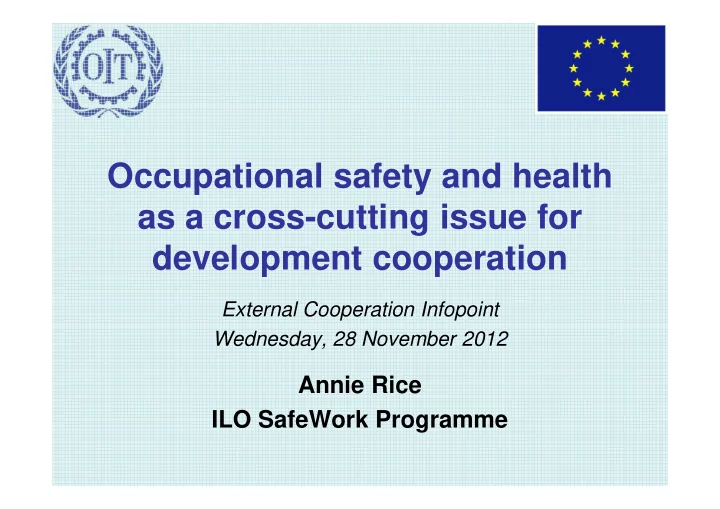

Occupational safety and health as a cross-cutting issue for development cooperation External Cooperation Infopoint Wednesday, 28 November 2012 Annie Rice ILO SafeWork Programme
OSH – a matter of life and death • Over 2 million people die around the world each year as a result of their work. • Every day around 1,000 people go out to work and simply don’t return home because they die in occupational accidents. • The global economic cost of occupational accidents and diseases is estimated at 4% of the global gross domestic product (GDP) Around 5,500 people per day! Around 5,500 people per day!
A “cycle of neglect” OSH IS A LOW PRIORITY Public Social ignorance Invisibility Lack of Less resources treatment, for information compensation Lack of Under- regulations reporting
Investing in OSH – exploding the myths � We can’t “afford” the best safety and health at work, it will hold back our development efforts… � The global economic crisis… But consider the costs of NOT improving safety and health at work:
Impact at national level Costs of work-related injury and ill-health* in the UK, 2009-10 • To individuals: 7.6 billion GBP • To employers: 3.1 billion GBP • To Government: 3.3 billion GBP • Total to society: 13.9 billion GBP A country that fails to account for the full cost of poor working conditions is undermining its economic health as well as its physical health (* does not include fatal diseases or latent occupational diseases)
Costs are large compared with other health issues Direct and indirect costs (example of USA) associated with: � Work-related injuries/diseases$155 billion � HIV/AIDS $ 30 billion � Alzheimer’s disease $ 67 billion � Musculoskeletal disorders $149 billion � Cancer $171 billion � Circulatory disorders $189 billion
Making the links between OSH and other policy agendas • Bringing OSH into the mainstream of development discourse • Funding for health-related Millenium Development Goals • Increased attention to preventable diseases such as TB, AIDS, malaria as threats to health and social progress • Paradox – poor working conditions is one of chief preventable causes of ill-health
Priority areas of development cooperation – Poverty Reduction To contribute to a more inclusive and productive society through a reduction in occupational accidents and diseases Accident/ Downward mobility occupational disease Incapacity to work Disability benefits Early retirement Exclusion Death
Priority areas of development cooperation – Education • School-to-work programmes • Vocational training • Tertiary education and training of safety professionals
Priority areas of development cooperation – Health / preventing the spread of AIDS • HIV/AIDS as a workplace issue – Minimising risk of occupational exposure – Accommodation of the workplace – Workplace wellness programmes – Developing the role of OSH personnel • Economic conditions which affect the course of the AIDS epidemic – look at the root causes of vulnerability – Restore the meaning in life – get young people into good quality (safe) jobs
Priority areas of development cooperation – Development of the productive sector • Sector-level interventions: – Agriculture and food security – Water and sanitation – Transport and infrastructure • Higher productivity and a better place to work (ILO WISE and WIND programmes) • OSH services to complement programmes designed to support SMEs
Cross-cutting issues in development cooperation • Governance – Good governance for achieving goals – Links with human rights, including right to decent (safe) work “Work is central to people’s lives, to the stability of families and societies. It is key to poverty reduction and to the achievements of social inclusion and social cohesion. Such work must be of acceptable quality. Decent work must be safe work …” Juan Somavia, ex-Director General, ILO
Cross-cutting issues in development cooperation • Gender equality – “Men die at work, women get ill” – Different risks in a highly segregated labour market – health, education, agriculture, textiles… – Lack of gender perspective which leads to exclusion of women and their concerns in OSH research, standard-setting… – Labelling of women as a “vulnerable group” which leads to discrimination – Analysis of gender dimension in OSH – and vice versa
Sustainable development - Building a nation needs employable workers
Recommend
More recommend